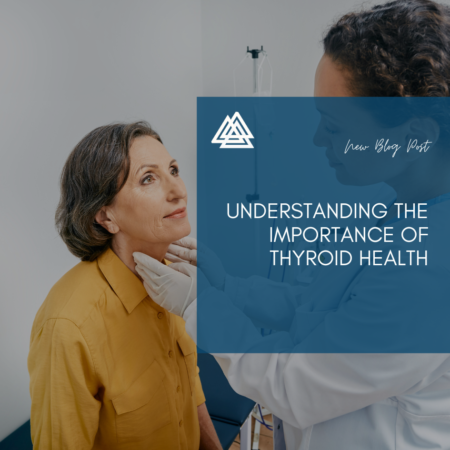 January is Thyroid Awareness Month, a perfect time to focus on one of the most important yet often overlooked glands in your body: the thyroid. This small, butterfly-shaped gland located in your neck plays a critical role in regulating your metabolism, energy levels, and overall health. Let’s explore the vital functions of the thyroid, common disorders, and why regular check-ups are essential for maintaining optimal health.
January is Thyroid Awareness Month, a perfect time to focus on one of the most important yet often overlooked glands in your body: the thyroid. This small, butterfly-shaped gland located in your neck plays a critical role in regulating your metabolism, energy levels, and overall health. Let’s explore the vital functions of the thyroid, common disorders, and why regular check-ups are essential for maintaining optimal health.
What Does the Thyroid Do?
The thyroid produces hormones that influence nearly every organ and system in your body. Key functions include:
Metabolism Regulation: Thyroid hormones determine how quickly your body uses energy from food.
Heart Health: They help control your heart rate and maintain cardiovascular health.
Temperature Control: Your thyroid assists in regulating body temperature.
Growth and Development: It plays a crucial role in childhood growth and brain development.
When the thyroid is functioning properly, you may not even notice it. However, when it’s out of balance, it can significantly impact your health.
Common Thyroid Disorders
Thyroid problems are more common than many people realize, especially in women. Here are some of the most prevalent disorders:
1. Hypothyroidism
What It Is: A condition where the thyroid doesn’t produce enough hormones.
Symptoms: Fatigue, weight gain, cold sensitivity, depression, and dry skin.
Causes: Often linked to autoimmune diseases like Hashimoto’s thyroiditis.
2. Hyperthyroidism
What It Is: When the thyroid produces too much hormone.
Symptoms: Weight loss, rapid heartbeat, anxiety, sweating, and tremors.
Causes: Commonly associated with Graves’ disease or thyroid nodules.
3. Thyroid Nodules
What They Are: Lumps or growths on the thyroid, which may be benign or malignant.
Symptoms: Often asymptomatic, but large nodules may cause difficulty swallowing or breathing.
4. Goiter
What It Is: An enlargement of the thyroid gland.
Symptoms: Visible swelling in the neck and potential difficulty with breathing or swallowing.
Causes: Often linked to iodine deficiency or thyroid dysfunction.
5. Thyroid Cancer
What It Is: Cancer originating in the thyroid gland.
Symptoms: Lump in the neck, hoarseness, or difficulty swallowing.
Prognosis: Highly treatable when detected early.
The Importance of Regular Check-Ups
Thyroid disorders can often go undiagnosed because symptoms are easily mistaken for other conditions. Regular screenings and discussions with your healthcare provider are critical for early detection and effective management. Here’s what to do:
Annual Physical Exams: Ask your doctor to check for thyroid abnormalities during routine check-ups.
Blood Tests: Tests like TSH (thyroid-stimulating hormone) and free T4 can identify thyroid imbalances.
Ultrasound: Imaging may be used to assess nodules or other structural issues.
If you experience symptoms like unexplained fatigue, weight changes, or mood shifts, don’t hesitate to seek medical advice.
Tips for Supporting Thyroid Health
While not all thyroid conditions can be prevented, these steps can help maintain a healthy thyroid:
Eat a Balanced Diet:
Include iodine-rich foods like fish, dairy, and iodized salt.
Incorporate selenium and zinc, found in nuts and seeds, for optimal thyroid function.
Stay Active:
Regular exercise supports overall hormonal balance.
Manage Stress:
Chronic stress can negatively impact thyroid health. Practice relaxation techniques like yoga or meditation.
Avoid Environmental Toxins:
Minimize exposure to chemicals that may disrupt thyroid function, such as BPA in plastics.
Take Action This Thyroid Awareness Month
Your thyroid is small but mighty, and keeping it healthy is key to your overall well-being. This January, take a moment to prioritize your thyroid health by scheduling a check-up, eating a nutrient-rich diet, and staying informed about potential symptoms. Early detection and proactive care can make all the difference.
For more tips and resources, visit https://www.prism-medical.com. Here’s to a healthy and empowered 2025!
